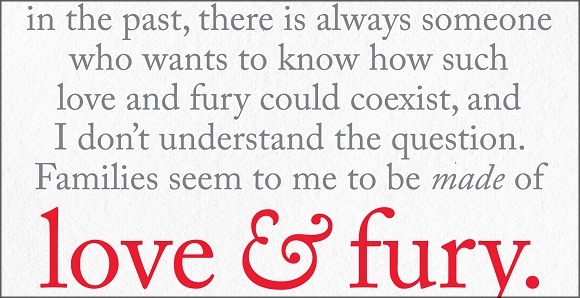Rebreaking the Bone of One’s Life Story: Richard Hoffman on ‘Love & Fury’
By Richard Hoffman

Editor's Note: Richard Hoffman is the author of Love & Fury, a memoir about the knotted ties of family and forgiveness. Richard joins us today to discuss the meaning of memoir, and how truth rarely lies at the surface of the search.
I wrote a memoir. It isn't about me.
I'll try to explain.
Not long ago, a friend of a friend, having heard I'd written a memoir, asked me if it was healing for me. Oh, brother, I thought. Here we go again. I find it exasperating that people who profess to be literate continually make the assumption that memoir is chiefly a therapeutic genre, one whose aim is to heal. Heal what? Experience?
But I hid my frustration so as not to give offense; the question had been asked in good faith. I gave her an answer designed to allow her to reinterpret the pained look on my face as a search for the right word. "I would say that it helped me integrate a number of themes in my life during the period I was writing about." She still looked a little bit stung as if I had, in fact, put her down. So I continued. "So I guess in that sense, I'd have to answer yes. Yes, it was healing for me."
I think that simply telling one’s story is valuable. Doing so may be therapeutic. And the text one creates by writing down what happened to you may be important as a document, an account, as a piece of the historical record. But facts are themselves of no literary value whatsoever. The truth must be told with all the artfulness of a lie.
We have a strange idea that the truth is always simple, that it is something you blurt out. No artist or scientist would ever agree with that formulation! The truth is what you arrive at after painstaking investigation, and the truth of our own lives is no exception. The story you are holding onto is probably not the story.
Questions emerge if you listen attentively. You have to follow the themes as they arise. Trust the unconscious. The story that emerges from that long process will not be the story you have been telling yourself for your own comfort and consolation. We all have that story and we can keep spackling the cracks in it forever, but that won’t help us in the deep way writing can heal us. (And yes, I used the word heal. If I were not hurt, injured, I would never have needed its healing, integrative power so badly in the first place, so, yes, healing, but healing hurts, and it requires rebreaking the bone of the official story, the one that insists you are whole and just fine thank you very much.)
Love & Fury is the story of a year in which my father was dying and my grandson was born, a year in which my son failed out of college, my daughter and her Jamaican boyfriend and their baby moved in with us, a year in which my wife was diagnosed with breast cancer, and my grandson's father was sent to prison. My project was to see what I could learn -- as a son, a father, a husband, and a grandfather -- from deeply considering my life and the lives of those around me. That meant examining war and violence and patriarchy and family and marriage and racism and money and misogyny and sexuality and class and all the ways these things intersect. The book is about what I have been able to see from my particular vantage, what I've been given to try to understand.
The best memoirs, I believe, are looking for the narrative coherence we recognize as meaning. This is not the same as trying to bend experience to a simple "arc" or a "rising action/climax/resolution" formula. In fact, that formula seems to me to make one ineligible for insight. Finding the form is discovering the meaning.
I think a successful memoir leads the author away from the self.
So, as I said at the outset, the story is not about me. The story would be about me if the class system that shames poor people was no longer doing so; if families and children were no longer visited by the violent ghosts of their father's wars; if racism were merely historical; if instead of caging human beings in prisons for responding in predictable ways to hostile and soul crushing circumstances, society chose to invest in changing those circumstances; then, yes, this story would be about me. Until then, I am merely the one trying to understand these things as they have issued in my life as an American son, father, husband, and grandfather. I live in history, as we all do, and I am trying my best to understand what that means.
